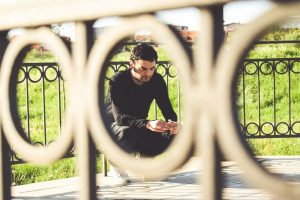 “To spare oneself from grief at all cost can be achieved only at the price of total detachment, which excludes the ability to experience happiness.” —Erich Fromm
“To spare oneself from grief at all cost can be achieved only at the price of total detachment, which excludes the ability to experience happiness.” —Erich Fromm
We all know breakups are hard. Every one of us has experienced some form of heartache at one point or another, but we all experience and are affected by it in different ways. Why do some of us come out stronger in the end while others end up feeling beaten down and defeated? How can we harness the potential healing power of pain?
Fortunately, with enough will and hard work, this is a skill that can be learned by almost anyone.
Any breakup, even in the shortest-lived of relationships, can hurt like hell. One of the most devastating losses one can face, aside from the loss of a loved one, is the loss of potential—what could have been. The beginnings of any relationship carry with them the seeds of unlimited hope and potential. More often than not when a relationship doesn’t work out, it is not necessarily the person we ache for, but rather the story we created around them: what the person could have brought to our life, the vision we had for ourselves, and how the person fit into that vision.
Breakup: Where Crisis Meets Opportunity
Like any crisis, a breakup can be an opportunity. In his book You Can Heal Your Heart: Finding Peace After a Breakup, Divorce, or Death, David Kessler describes loss as a window into old wounds. The end of any romantic relationship, be it a 20-year marriage or a three-month fling, can trigger a number of unconscious memories and hurts we thought had long ago healed. Much in the same way a familiar scent can take us back to a long-forgotten time or place, the pain of a breakup can open the deepest of wounds.
This could be just what we need to compel us to take a good look at our patterns and begin to change them. Breakups can be opportunities to reclaim our lives, on our terms, and to change any distorted thinking we may have around love and relationships. For example, metaphorically speaking, do you tend to date the same person over and over again, or do you find yourself dating the parent who loved you the least? Do you tend to idealize your partners? This could be a chance to learn how to see through the initial fog of infatuation, let go of unrealistic ideals, and move toward the relationship that is right for you.
How to Cope with the Pain of Breakup
Kessler reminds us that if there is grief, there was love. What a beautiful thing to have been able to love and be loved! Though many would maintain it is better to have loved and lost than to have never loved at all, some may prefer to avoid potential heartache by never risking loss. This may be a way to avoid the temporary pain of breakup, but it’s also a surefire way to miss out on one of the greatest joys of life.
Keeping the positive front and center in the devastating aftermath of a breakup is no easy task, though. So what to do? How to cope? The following are a few ideas and reminders:
- Give yourself permission to mourn. You don’t heal if you don’t feel! Perhaps the most unproductive thing you can do with your emotions is shut them off. Whether five years or five months, a broken attachment hurts. The length of time or circumstances don’t matter so much as what these wounds stir up unconsciously. We all carry some baggage, but if you don’t allow yourself time to go through the stages of grief, you may run the risk of taking unresolved anger and resentment into your next relationship.
- Reach out to your “fan club.” Surround yourself with positive supports. This is especially important if you were with someone who was emotionally or otherwise abusive. Spend time with friends, family, mentors, and others who can reflect back to you the wonderful, valuable, lovable person you are.
- Talk to a helping professional. As a therapist, I may be biased, but if you’re not already in therapy you may want to consider it—especially if you recognize destructive patterns in your relationships. Working with a therapist, whether individually or in a group setting, is a great way to learn about and begin to change unhealthy relational patterns.
- Find the lesson meant for you. As Kessler notes, breakups can be opportunities to learn about yourself and grow. Learning a “lesson” doesn’t mean you did something wrong. It means taking ownership of your happiness and taking advantage of a chance to create stronger relationships and possibly heal hurtful memories and distorted beliefs.
- Channel your creativity. If you haven’t already done so, try to identify a creative outlet or activity that speaks to you and helps you heal. This can be journaling, painting, or taking an improv class, for example. As a writer and a former actor, I can attest to the cathartic power of creative pursuits.
- Get back out there. There is something to be said for so-called “rebound” relationships—so long as all involved are honest with each another about what they’re looking for and how long they’re looking for it. Only you can determine when you are ready to re-enter the dating world. Whether for the purpose of finding a long-term relationship or simply to broaden your social circle, meeting people and cultivating new friendships, romantic or otherwise, can nourish the soul and help you develop a support network. So even if your next date doesn’t turn out to be the one, they could turn out to be a new best friend!
Of course, all of this is substantially easier said than done. As I write this, I’m reeling from my own recent breakup. It is what compelled me to write this piece, as writing is one of my creative healing outlets. My hope is to remain faithful to the advice I offer above. I will allow myself to grieve as I look for the lessons meant for me. And during the most difficult moments, I will remind myself that where there is grief, there was once love.
References:
- Hay, L., & Kessler, D. (2015). You can heal your heart: Finding peace after a breakup, divorce, or death. Carlsbad, CA: Hay House, Inc.
- Kübler-Ross, E., & Kessler, D. (2005). On grief and grieving: Finding the meaning of grief through the five stages of loss. New York, NY: Scribner.

The preceding article was solely written by the author named above. Any views and opinions expressed are not necessarily shared by GoodTherapy.org. Questions or concerns about the preceding article can be directed to the author or posted as a comment below.

 The Secret to Happiness: How to Create the Life You Want
The Secret to Happiness: How to Create the Life You Want 6 Signs the Single Life Is Right for You Right Now
6 Signs the Single Life Is Right for You Right Now Closer to Closure: 10 Tips for Moving On After Getting Dumped
Closer to Closure: 10 Tips for Moving On After Getting Dumped

Please fill out all required fields to submit your message.
Invalid Email Address.
Please confirm that you are human.
Leave a Comment
By commenting you acknowledge acceptance of GoodTherapy.org's Terms and Conditions of Use.